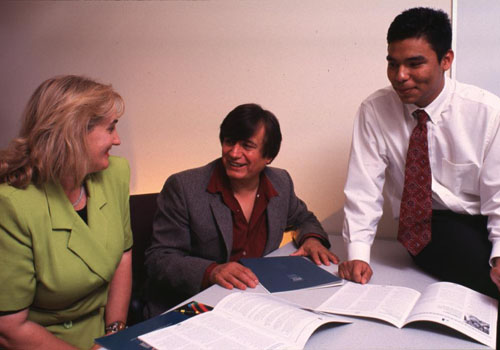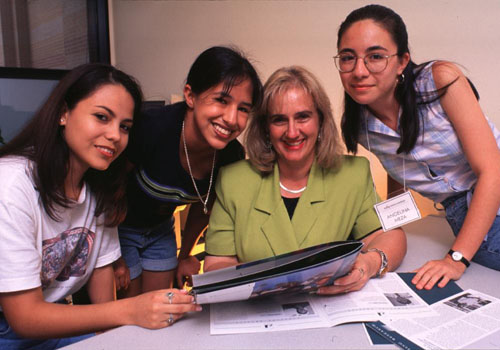
Spring/Summer 1999
Volume 6, Issue 2
Spring/Summer 1998
Volume
3, Issue 1
January 1995
Volume
2, Issue 4
October 1994
Volume
2, Issue 1
January 1994
Spotlight on Teachers
by GirlTECH/MCSA Workshop Co-Directors Richard Tapia and Cynthia LaniusThis summer, the CRPC took a major step toward readying its highly successful teacher training programs for replication nationwide. This replication is a result of the recently announced National Science Foundation's Partnership for Advanced Computational Infrastructure (PACI) program. Richard Tapia, CRPC Director of Human Resources and Education, and Roscoe Giles of Boston University will lead the educational programs of the two PACI lead centers -- the National Computational Science Alliance (NCSA), headquartered at the University of Illinois at Urbana-Champaign; and the National Partnership for Advanced Computational Infrastructure (NPACI), headquartered at the University of California, San Diego (UCSD).
In order to streamline CRPC programs, yet retain the strengths of two of them, Tapia and CRPC Manager of K-12 Programs Cynthia Lanius combined the CRPC's GirlTECH with the Mathematical and Computational Sciences Awareness (MCSA) Workshop. Aimed at equipping teachers to encourage minorities and women in careers in the computational sciences, the workshop met from June 9-20 when its 20 participants
- Explored diversity issues in the computational sciences through presentations and group discussions
- Learned to use Internet resources as research, teaching, and collaboration tools
- Created their own homepages, designed and published Web-based math and science curricula, and created homepages for their schools
- Gained an awareness of the latest research in the computational sciences and heard from business and industry leaders about their expectations of students for the 21st century
- Became members of CRPC's ongoing teachers' technology electronic support group that communicates throughout the year
- Learned how to establish student technology councils on their campuses to ensure a transfer of knowledge to their students and
-
Made a one-year commitment to advanced training (three Saturday
sessions) and to an integration of technology into their teaching
practices.
 |
|
| Images by Ewasko | |
This year also marked a milestone in financial support for the program. For the first time, a private foundation, the RGK Foundation of Austin Texas, sponsored the GirlTECH program as it provided $5,000 to train teachers and encourage more young women and underrepresented minorities to pursue mathematics and science careers. The foundation, established in 1966 and chaired by Gregory A. Kozmetsky, supports programs that attract minority and women students into the fields of mathematics, science, and technology as part of a larger general interest in supporting education and medicine.
 |
|
| Image by Ewasko | |
Master teachers for the Internet training sessions of the program included Susan Boone of Saint Agnes Academy (Houston), Barbara Christopher of Eisenhower High School (Aldine ISD), and Judy Woods of Reed Intermediate School (Aldine ISD). Debbie Campbell of the CRPC served as technical coordinator.
To learn more about GirlTECH, visit http://teachertech.rice.edu/. To learn more about MCSA, visit http://www.crpc.rice.edu/CRPC/MCSA . To see the math and science lessons, visit http://teachertech.rice.edu/Lessons. To see this year's training schedule and materials, visit http://teachertech.rice.edu/Materials .
Other GirlTECH Photos
Table of Contents